Table of Contents
Get started with MyPerfectResume today!
- Build a resume on any device
- Pick an ATS-friendly template
- Tailor with AI copy suggestions
Why this resume works
- Quantifies accomplishments: Measurable accomplishments, such as providing therapy to over 50 clients monthly and achieving a 70% improvement rate, highlight the applicant’s tangible impact.
- Showcases career progression: The applicant’s journey from mental health counselor to clinical psychologist showcases a steady career progression with increasing responsibility and impact across various roles.
- Illustrates problem-solving ability: Implementing a stress reduction program at Harmony Health Clinic illustrates the applicant’s problem-solving skills by addressing client needs with innovative solutions.
More Clinical Psychologist Resume Examples
Explore our clinical psychologist resume examples to effectively showcase your therapeutic skills and relevant experience. These psychology resume samples will assist you in crafting a resume that highlights your expertise in psychological assessment and treatment.
Entry-Level Clinical Psychologist
Why this resume works
- Centers on academic background: A master’s degree in clinical psychology emphasizes the applicant’s strong academic foundation, which is important for early career development.
- Puts skills at the forefront: By prioritizing skills like cognitive behavioral therapy at the top, this layout aligns with the skills-based resume format, improving visibility for entry-level roles.
- Shows digital literacy: Experience in developing therapy programs showcases digital readiness, as highlighted by computer skills essential for modern therapeutic techniques.
Mid-Level Clinical Psychologist
Why this resume works
- Demonstrates language abilities: Leveraging language skills in Spanish, French, and Mandarin enriches cross-cultural communication during therapy sessions, improving international client interactions effectively.
- Points to measurable outcomes: Reducing client anxiety scores by 30% and increasing patient satisfaction by 25% illustrate powerful contributions to mental health improvement through quantifiable achievements.
- Includes a mix of soft and hard skills: The applicant seamlessly integrates technical expertise in CBT with interpersonal skills like therapeutic communication, creating a comprehensive approach to patient care.
Experienced Clinical Psychologist
Why this resume works
- Focuses on work history: Using a chronological resume, the applicant showcases their extensive career, highlighting roles in mental health across major cities over nearly two decades.
- Showcases impressive accomplishments: The applicant’s standout achievements, such as a 40% increase in patient satisfaction, reveal impressive senior-level performance and significant impact on treatment outcomes.
- Lists relevant certifications: With certifications like Certified Clinical Psychologist from APA, the applicant’s dedication to expertise and continuous learning is evident.
Clinical Psychologist Resume Template (Text Version)
Chris Miller
Lakeside, CA 92056
(555)555-5555
Chris.Miller@example.com
Professional Summary
Dedicated Clinical Psychologist with 9 years’ experience in diverse therapy settings. Expertise in CBT, individual counseling, and mental health advocacy to improve client outcomes by up to 70%.
Work History
Clinical Psychologist
MindWorks Therapy Center – Lakeside, CA
February 2022 – August 2025
- Provided therapy to 50+ clients monthly
- Developed treatment plans achieving 70% improvement
- Conducted workshops for mental health awareness
Behavioral Health Therapist
Harmony Health Clinic – San Diego, CA
January 2017 – January 2022
- Led group therapy sessions with 90% satisfaction
- Mentored 5 junior therapists on clinical protocols
- Initiated stress reduction program, improving outcomes
Mental Health Counselor
Wellness Minds Center – Los Angeles, CA
January 2013 – December 2016
- Consulted clients, increasing retention by 25%
- Assessed psychological assessments for 100+ clients
- Created client plans, increasing therapy effectiveness 30%
Skills
- Cognitive Behavioral Therapy
- Individual Counseling
- Psychological Assessment
- Crisis Intervention
- Research and Analysis
- Mental Health Advocacy
- Treatment Planning
- Interpersonal Communication
Education
Master of Science Clinical Psychology
Columbia University New York, NY
May 2012
Bachelor of Arts Psychology
University of California Los Angeles, CA
May 2010
Certifications
- Licensed Clinical Psychologist – American Board of Clinical Psychology
- Certified Cognitive Behavioral Therapist – National Association of Cognitive-Behavioral Therapists
Languages
- Spanish – Beginner (A1)
- French – Beginner (A1)
- Mandarin – Beginner (A1)
Related Resume Guides
Advice for Writing Your Clinical Psychologist Resume
Dive into our advice section on how to write a resume tailored for clinical psychologists, and discover ways to highlight your therapeutic expertise and dedication to mental health care.
Write a strong professional summary
A professional summary on a resume serves as an introduction to hiring managers, offering a snapshot of your career. When creating your resume, you can choose between a summary and an objective, based on your experience level and what you want to communicate.
A professional summary briefly showcases your experience, skills, and achievements in three to four sentences. It’s best suited for experienced applicants who have a robust work history. The purpose is to highlight your professional identity and the value you bring to potential employers.
On the other hand, resume objectives focus on career goals and are ideal for entry-level individuals, those changing careers, or those with employment gaps. They contrast with summaries by emphasizing “what I aim to contribute” instead of “what I’ve accomplished.”
Next, we’ll provide examples tailored to various industries and experience levels for both summaries and objectives. Explore our extensive library of resume examples for additional inspiration.
Clinical psychologist resume summary examples
Entry-level
Recent psychology graduate with a master’s degree in clinical psychology from an APA-accredited program. Experienced in conducting assessments and supporting therapy sessions during internships at community mental health centers. Certified in Mental Health First Aid and skilled in using cognitive-behavioral techniques to assist clients in managing stress and anxiety.
Mid-career
Clinical psychologist with over seven years of experience working in private practice and hospital settings. Expertise in developing individualized treatment plans for diverse populations, focusing on anxiety disorders and depression. Licensed psychologist known for integrating mindfulness-based approaches and evidence-based therapies, along with strong diagnostic skills and a compassionate approach to patient care.
Experienced
Seasoned clinical psychologist specializing in trauma-informed care and complex case management. Over 15 years of experience leading interdisciplinary teams, implementing innovative therapeutic interventions, and conducting workshops on mental health awareness. Holds certifications in EMDR therapy and advanced CBT techniques, committed to driving positive outcomes through strategic leadership and comprehensive client support.
Clinical psychologist resume objective examples
Recent graduate
Compassionate and driven recent psychology graduate with a master’s degree in clinical psychology seeking an entry-level role to apply academic knowledge and counseling skills. Focused on supporting individuals in overcoming mental health challenges while contributing to a collaborative team environment.
Career changer
Dedicated professional transitioning into clinical psychology, with experience in conflict resolution and interpersonal communication gained through roles in education and social work. Eager to apply formal training and a passion for mental health advocacy to provide empathetic care within therapeutic settings.
Specialized training
Clinical psychology trainee with specialized coursework in cognitive behavioral therapy and trauma-focused interventions seeking an opportunity to assist diverse populations. Committed to leveraging evidence-based techniques to promote emotional well-being and foster resilience among clients.
Make your clinical psychologist resume stand out with our easy-to-use AI Resume Builder. Choose a design, fill in your details, and get a professional resume ready quickly.
Include relevant certifications and training
Certifications and specialized training are essential for clinical psychologists because they show expertise in the field and compliance with licensing requirements. They also demonstrate a commitment to ongoing education, which is critical in healthcare roles where practices evolve.
Highlighting these credentials helps employers see that you meet industry standards and have the skills needed to provide effective patient care. Here are a few examples:
- Licensed Psychologist (LP)
- Certified Clinical Trauma Professional (CCTP)
- Board Certification in Clinical Psychology (ABPP)
- Dialectical Behavior Therapy Training Certification
- Eye Movement Desensitization and Reprocessing (EMDR) Certification
Listing certifications in a dedicated section ensures they stand out on your resume. These credentials prove your readiness for the role and help build trust with employers or clients. Including them alongside your education makes your qualifications more complete.
Example of a certifications section
Licensed Clinical Psychologist
Issued by: American Board of Professional Psychology (ABPP)
Issued 2021
Certified Cognitive Behavioral Therapist (CBT)
Issued by: National Association of Cognitive-Behavioral Therapists (NACBT)
Expires 2025
Certified Addictions Counselor (CAC)
Issued by: National Association for Alcoholism and Drug Abuse Counselors (NAADAC)
Issued 2020
Registered Play Therapist (RPT)
Issued by: Association for Play Therapy (APT)
Expires 2024
Certified Dialectical Behavior Therapy Professional (CDBT)
Issued by: Dialectical Behavior Therapy National Certification Program
Issued 2023
Choose a polished and well-organized resume template that effectively showcases your skills and qualifications to stand out to hiring managers in your field.
Showcase your work experience
Showcasing relevant work experience on a resume is key to demonstrating your qualifications for the role of a clinical psychologist. Employers want to see what you’ve done before and how it relates to the job you’re applying for. By listing your experiences in reverse chronological order, you help employers quickly find your most recent and relevant roles.
This order includes the job title, employer name, location, and employment dates. Using action-oriented language such as “developed,” “implemented,” or “led” helps highlight your achievements and responsibilities clearly.
It’s also important to show measurable results where possible. For example, instead of saying you provided therapy sessions, you might say you conducted over 300 therapy sessions annually with a focus on cognitive behavioral techniques that improved patient outcomes by 20%.
Including core responsibilities like conducting assessments, developing treatment plans, leading group therapy sessions, and collaborating with healthcare teams gives employers a clear picture of your skills. Use specific examples to show how you’ve made a difference in past roles.
By presenting your work experience this way, you’re telling a story about your professional journey as a clinical psychologist. This approach makes it easier for potential employers to see how you’d fit into their team and contribute positively from day one.
5 clinical psychologist work history bullet points
- Conducted over 200 individual therapy sessions annually, achieving a 90% patient satisfaction rate and improving mental health outcomes.
- Implemented a cognitive behavioral therapy program that reduced anxiety symptoms in patients by 40% within six months.
- Collaborated with a multidisciplinary team to develop personalized treatment plans, increasing recovery rates for depression by 25%.
- Supervised and mentored 4 psychology interns, improving their clinical skills and boosting departmental efficiency by 15%.
- Designed and facilitated workshops on stress management techniques, resulting in a 30% reduction in reported workplace stress cases.
For clinical psychologists, choose a resume format that highlights your therapy experience, relevant certifications, and skills in diverse mental health settings.
Match your resume with the job description
Tailoring resumes to job descriptions is important because it helps job seekers stand out to employers and pass through applicant tracking systems (ATS). To ensure an ATS-friendly resume, you should match your resume with the job description, which increases your chances of getting noticed.
An ATS-friendly resume includes keywords and phrases that reflect the skills needed for the job. By aligning these terms with your abilities, you improve your chances of catching hiring managers’ attention.
To find the right keywords, review clinical psychologist job postings carefully. Look for repeated skills, qualifications, and responsibilities such as “psychological assessments,” “treatment planning,” “evidence-based interventions,” or “interdisciplinary collaboration.”
Incorporate these terms naturally into your resume. For example, if a job description states “Conduct psychological assessments and develop treatment plans,” you might write “Conducted comprehensive psychological assessments and created individualized treatment plans to support patient progress.”
When you customize your resume, targeted resumes increase ATS compatibility by ensuring that your application aligns with what employers are looking for.
Catch mistakes before they cost you a job! Our ATS Resume Checker helps find any formatting problems, missing keywords, or structure issues so your resume is ready to impress.
FAQ
Do I need to include a cover letter with my clinical psychologist resume?
Yes, including a cover letter with your clinical psychologist resume can improve your application and increase your chances of landing an interview.
A cover letter allows you to express interest in the role while showing how your specific skills and experiences align with the job requirements.
For example, if the clinic focuses on cognitive behavioral therapy or has programs targeting certain disorders, you can highlight relevant experience or passion for these areas.
Using our Cover Letter Generator can help you create a personalized document that complements your resume and offers expert suggestions tailored to the psychological field.
Also, exploring cover letter examples provides valuable insights into effective ways to present your qualifications and make a compelling case for why you’re a strong fit for the position.
How long should a clinical psychologist’s resume be?
For a clinical psychologist, determining how long a resume should be largely depends on your experience and accomplishments.
If you’re early in your career or have less extensive experience, a one-page resume might suffice to highlight key skills and relevant training.
However, if you have numerous publications, certifications, and specialized roles, opting for a two-page resume can better showcase your qualifications. Just ensure that every detail is relevant to the clinical psychology field and adds value.
How do you write a clinical psychologist resume with no experience?
When crafting a resume with no experience for a clinical psychologist role, emphasize your education, relevant coursework, and any hands-on training to highlight your potential in the field. Here’s an effective way to organize your entry-level resume:
- Highlight educational background: Start by listing your psychology degree, including the university name, graduation year, and any academic honors. Mention courses like abnormal psychology or cognitive behavioral therapy that are particularly relevant.
- Leverage internships and practicums: Detail any internships or practicum experiences where you gained exposure to psychological assessments or therapeutic settings. Describe specific responsibilities or projects completed during these experiences.
- Showcase transferable skills: Emphasize skills such as active listening, empathy, and analytical thinking acquired through volunteer work or part-time jobs. These are important for a clinical psychologist’s role.
Consider reviewing our guide on writing a resume with no experience to find more targeted advice and examples tailored by career experts.
Rate this article
Clinical Psychologist
Share this page
Additional Resources
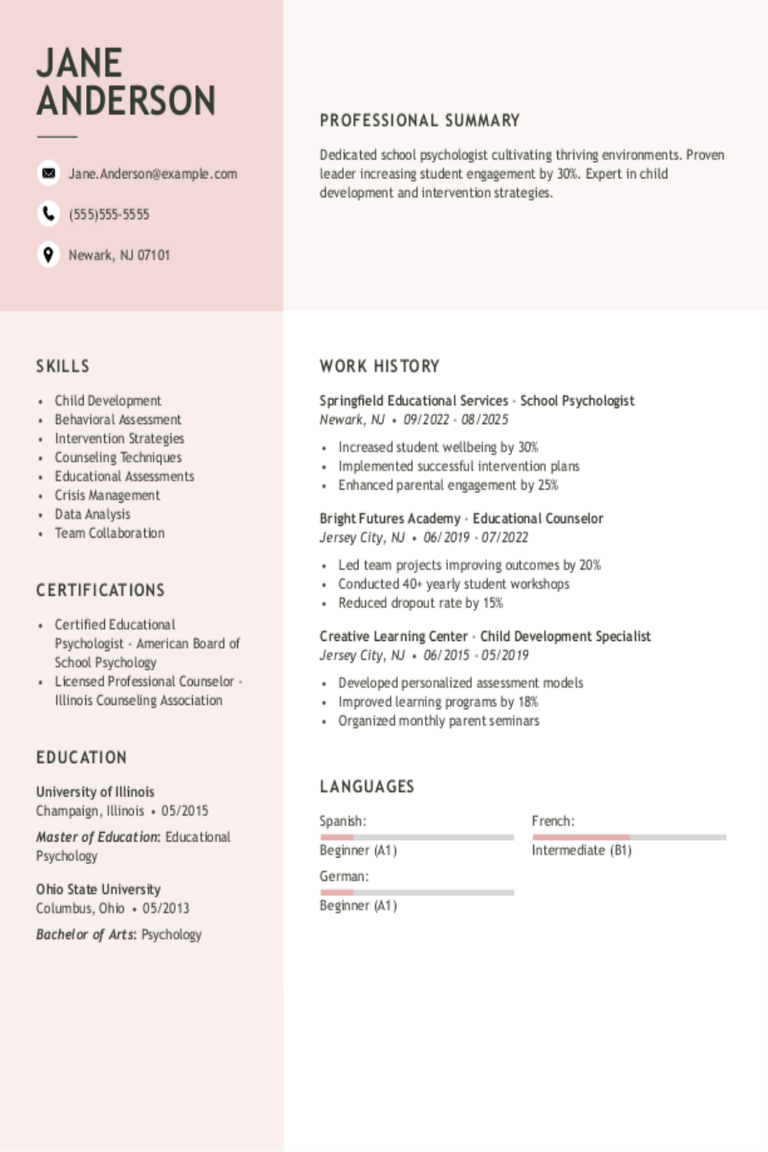
School Psychologist Resume Examples & Templates
Explore school psychologist resume examples and tips to learn how to showcase your skills in student assessment, counseling, and collaboration with teachers to stand out to hiring managers.Build my resumeImport
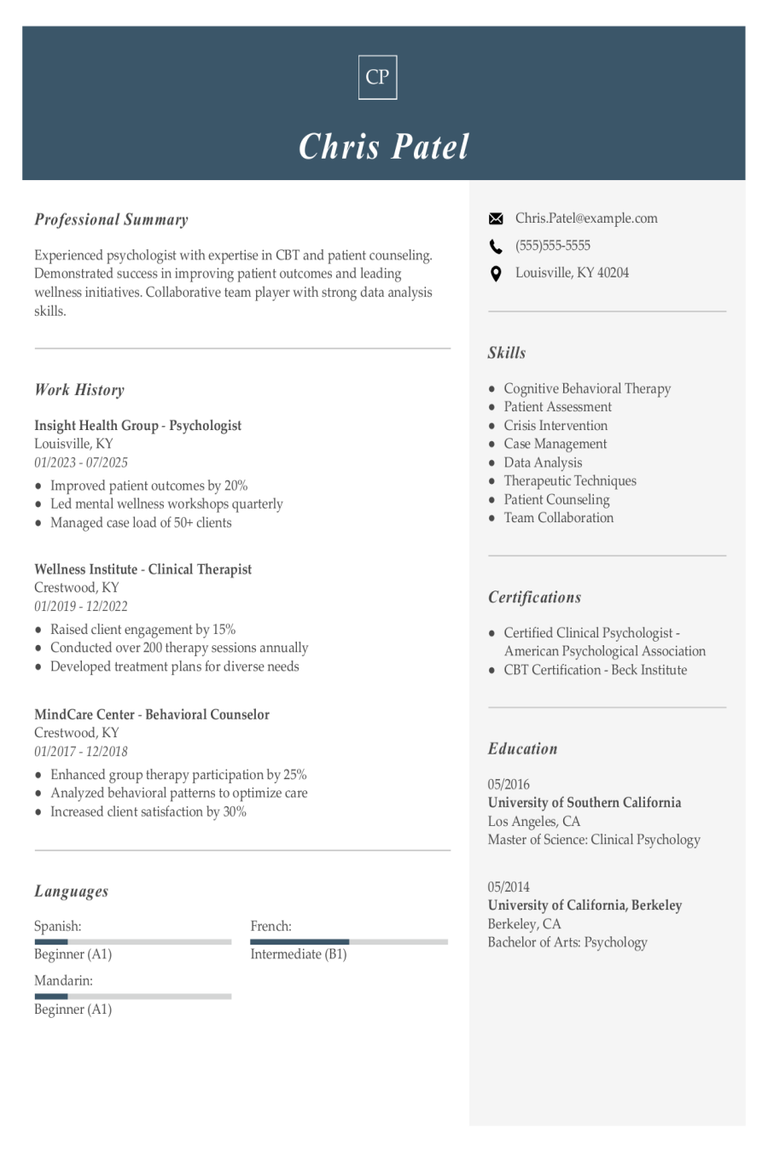
Psychologist Resume Examples & Templates
Explore psychologist resume examples that showcase experience caring for patients, conducting research, and analyzing behavior. These examples and tips will help you highlight empathy and communication skills while emphasizing your
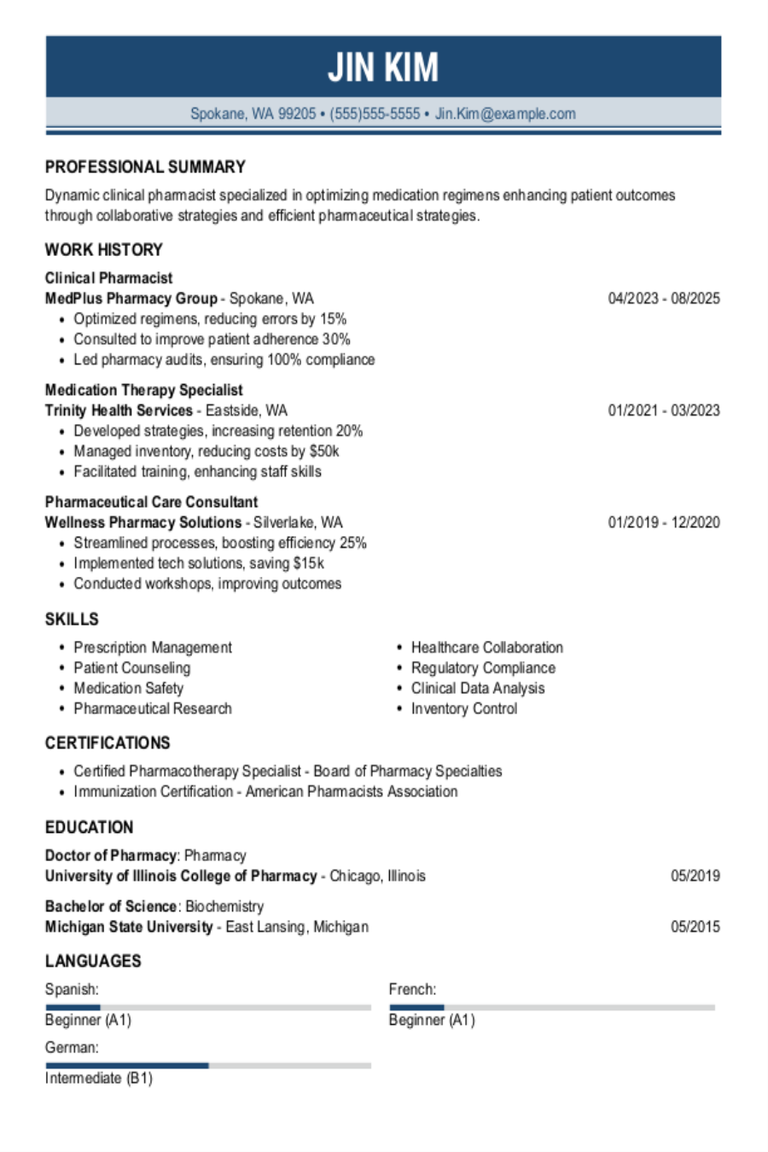
Clinical Pharmacist Resume Examples & Templates
Discover clinical pharmacist resume examples and learn how to showcase your patient care, medication management, and teamwork skills to stand out in the healthcare field.Build my resumeImport existing resumeCustomize this
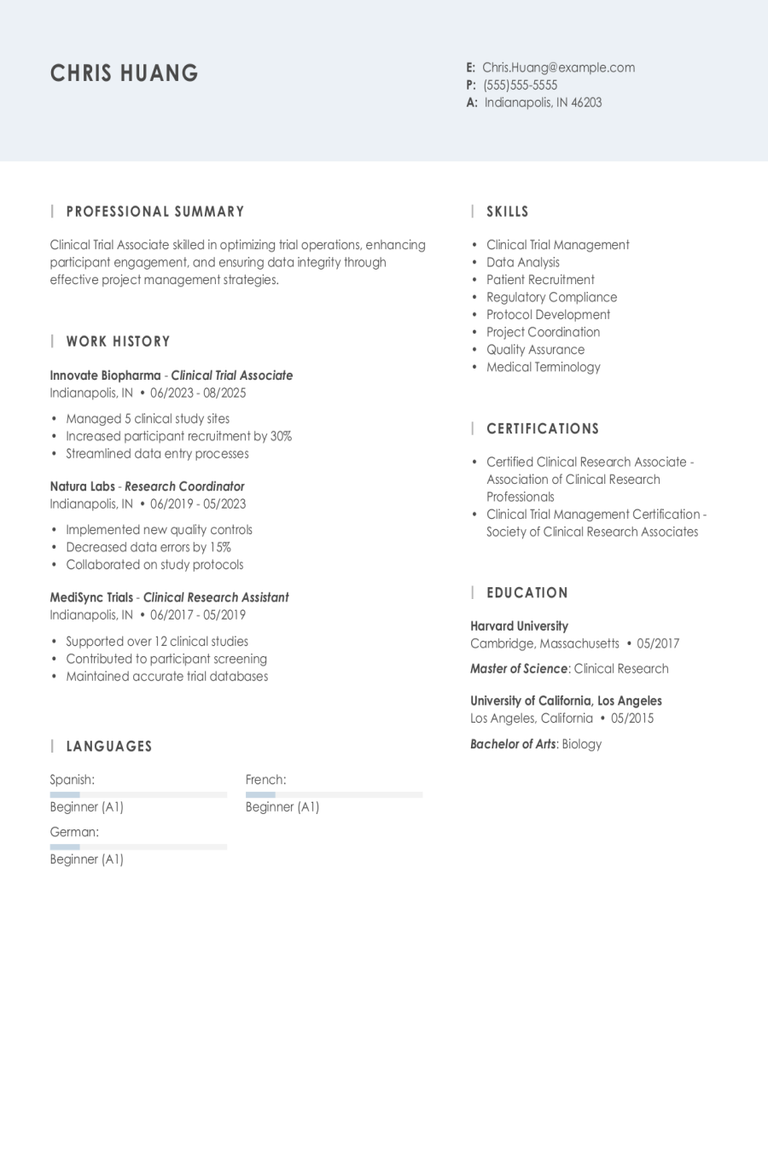
Clinical Trial Associate Resume Examples & Templates
Explore how clinical trial associates showcase their ability to manage studies and coordinate with teams. These examples and tips will help you highlight your skills in tracking data and ensuring
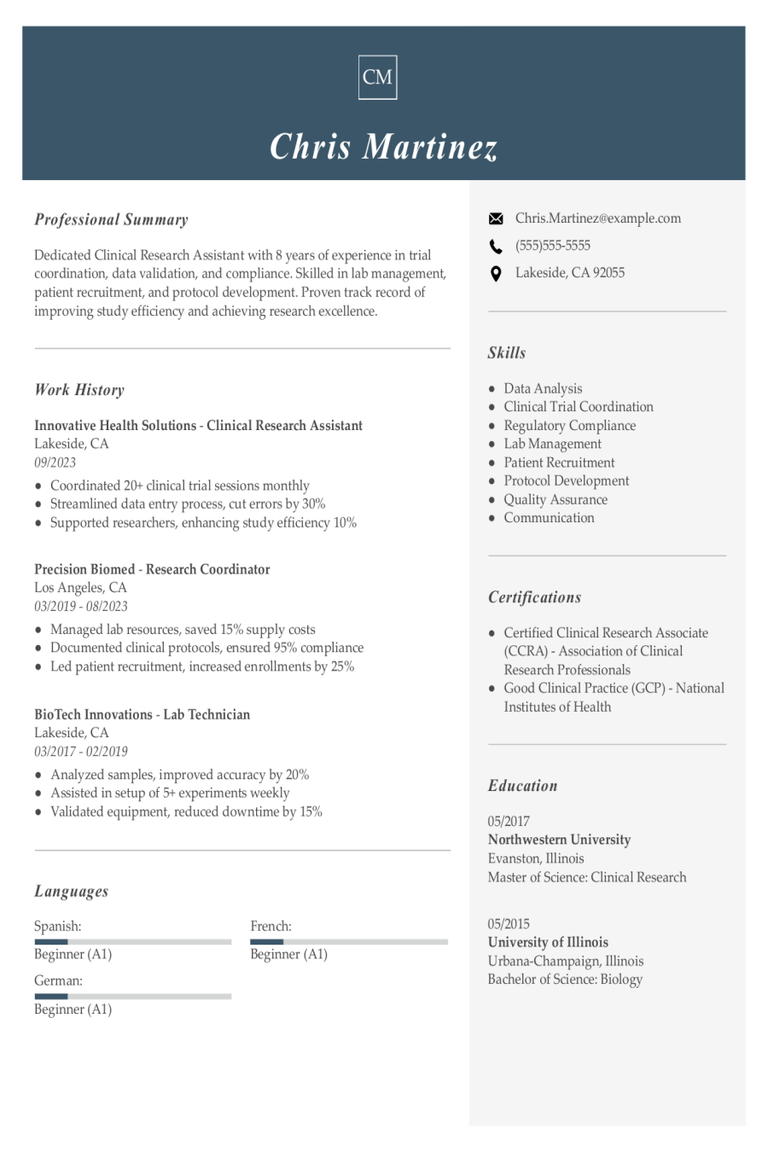
Clinical Research Assistant Resume Examples & Templates
Explore clinical research assistant resume examples to see how to write about collecting data, managing records, and supporting clinical trials. Learn how to highlight your role in helping researchers stay
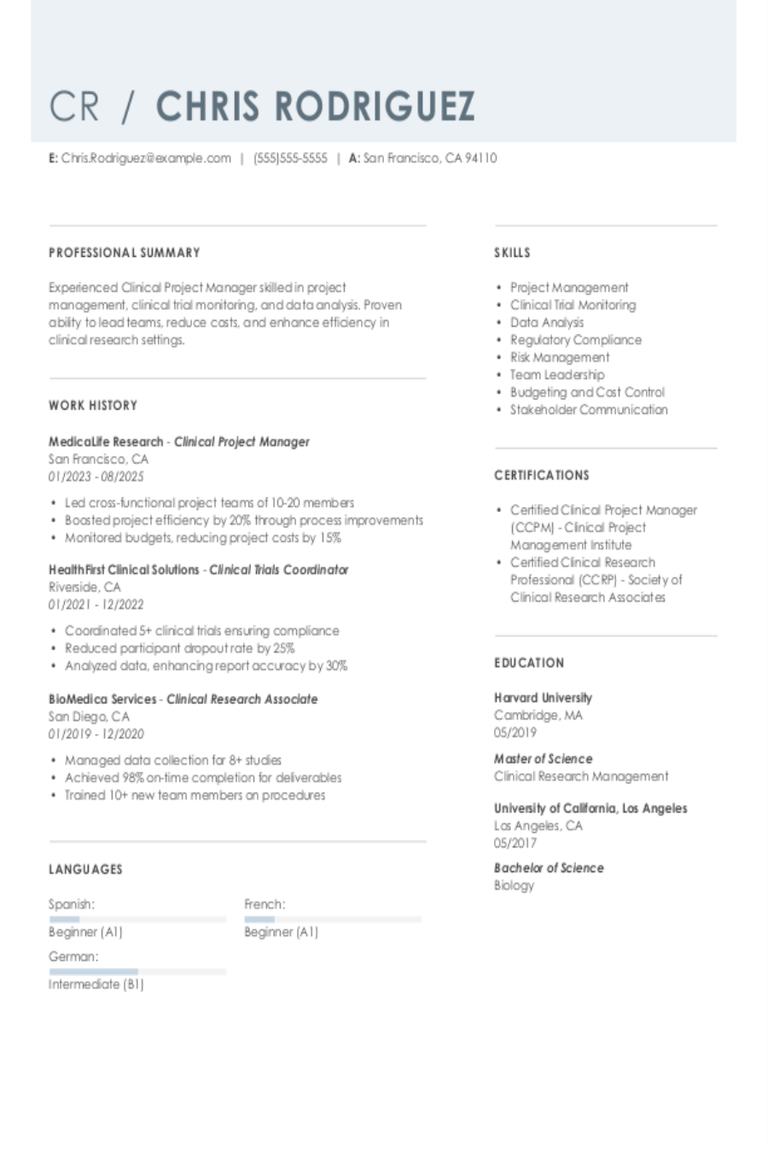
Clinical Project Manager Resume Examples & Templates
Explore clinical project manager resume examples to learn how to showcase your leadership in guiding medical studies and coordinating research teams. Get tips on emphasizing your ability to manage timelines,
